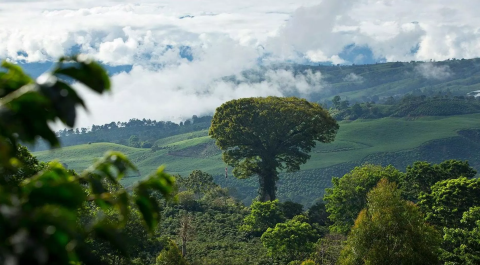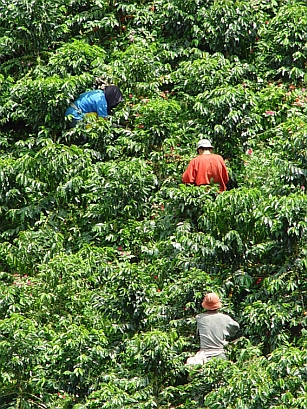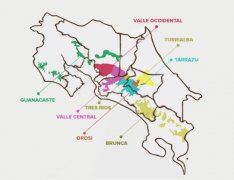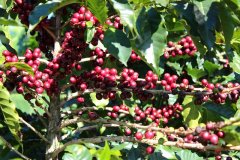Costa Rican Volcano Coffee effect of High altitude Volcanoes on the growth and Flavor of Coffee beans in Tarasu
Costa Rican Tarasu coffee grows in high-altitude volcanic soil, where cherries ripen more slowly, giving it a rich and rich flavor. Single-origin Tarrazu Estate coffee, known as one of the best coffee in the world, is roasted to medium color to retain its natural fullness, elegance and rich flavor.

Certification:
Kosher certification
Rainforest Alliance Certification
Flavor notes : apricots, juicy oranges and tropical fruits
Processing: washing process
Baking: medium baking
Drying: patio and machinery
Farm: regional Land-Tarazu Manor
Ph: 5.1
Similar products: Costa Rican original Tarasu also has decaf and deep baking
Single-origin coffee: growing on high-altitude volcanic soil
Certified authenticity: Costa Rican coffee is one of the most delicious coffee in the world, with its light, clean taste and wonderful aroma. Coffee should have a complete body and excellent acidity. The authentic Costa Rican Tarazu should have a silky taste, almost buttery taste and charming aroma, creating an excellent eloquent image. 100% pure Arabica Costa Rica Tarasu gourmet coffee is usually rare on the market, and many other coffees are often a mixture of misleading propaganda.

History and processing of Costa Rican primitive Tarasu Coffee: Costa Rican primitive Tarasu coffee grows on small farms in the mountains around the town of San Marco de Tarasu, south of the capital San Jose. The county-level manor, located in the Peris River basin in the Tarazu Highlands, produces Costa Rican coffee with the characteristics of Tarazu. Gravel Road connects farms with the nearby towns of San Pablo, San Marcos and Santamaria to form a coffee network known as "Los Angeles", or saints, which is recognized by the world as a pioneer of Costa Rican coffee exporters from the New World to Europe. The combination of volcanic soil, cool temperatures, humid climate, plenty of sunshine and tropical seasons provides a primitive environment for the growth of Arabica trees. In addition, Tarazu's coffee farm is the highest in the country, which means that their cherries are the last to ripen and harvest. Growing at an altitude of 4600 feet or more, the coffee beans produced are more acidic than those grown at low elevations, giving them a richer flavor. In addition, Costa Rican Tarasu coffee beans are described as harder, stronger and denser because they lose less weight than other coffee beans. In order to optimize the relevant taste, the cherries of the coffee factory must be harvested at the right time. The entire Costa Rican coffee harvest is picked by hand to ensure the quality of each bean, and each tree is actually visited four times to pick only the best fruit when it is ripe. When coffee beans arrive at a coffee factory in Costa Rica, extra care will be taken in the handling, inspection, classification and processing of coffee beans to ensure that any defective products are removed. The demand for Costa Rican Tarasu coffee requires very high-quality control procedures to ensure the richest and freshest aroma and flavor. The harder beans are then packaged and shipped there for baking. It takes longer to bake these hard coffee beans than those grown in low-altitude areas near the ocean.
Important Notice :
前街咖啡 FrontStreet Coffee has moved to new addredd:
FrontStreet Coffee Address: 315,Donghua East Road,GuangZhou
Tel:020 38364473
- Prev

A brief introduction to the multi-tower goddess manor in Costa Rica the story of multi-tower rose summer coffee beans and their flavor and taste characteristics
Costa Rica's Coopedota is located in the heart of Santa Maria de Dota's famous and rugged Tarrazu growing area, which is famous for its mineral-rich soil and ideal growing climate, as well as for its award-winning coffee. The cooperative was founded by 96 producers in the Dota Valley area in 1960 and has since grown to more than 800.
- Next

Story of Organic Coffee beans in Costa Rica what's the difference between organic coffee beans and ordinary coffee beans
Organic Costa Rican raw coffee is a kind of high quality weakly acidic coffee beans with a wide range of flavors with various roasting degrees. This kind of coffee can retain its full flavor and mellow anywhere from light roasting to deep roasting. If you are used to the usual coffee beans and want to change their taste, you can try this organic coffee bean that has been certified by the United States Department of Agriculture. The front street is for everyone.
Related
- Detailed explanation of Jadeite planting Land in Panamanian Jadeite Manor introduction to the grading system of Jadeite competitive bidding, Red bid, Green bid and Rose Summer
- Story of Coffee planting in Brenka region of Costa Rica Stonehenge Manor anaerobic heavy honey treatment of flavor mouth
- What's on the barrel of Blue Mountain Coffee beans?
- Can American coffee also pull flowers? How to use hot American style to pull out a good-looking pattern?
- Can you make a cold extract with coffee beans? What is the right proportion for cold-extracted coffee formula?
- Indonesian PWN Gold Mandrine Coffee Origin Features Flavor How to Chong? Mandolin coffee is American.
- A brief introduction to the flavor characteristics of Brazilian yellow bourbon coffee beans
- What is the effect of different water quality on the flavor of cold-extracted coffee? What kind of water is best for brewing coffee?
- Why do you think of Rose Summer whenever you mention Panamanian coffee?
- Introduction to the characteristics of authentic blue mountain coffee bean producing areas? What is the CIB Coffee Authority in Jamaica?

